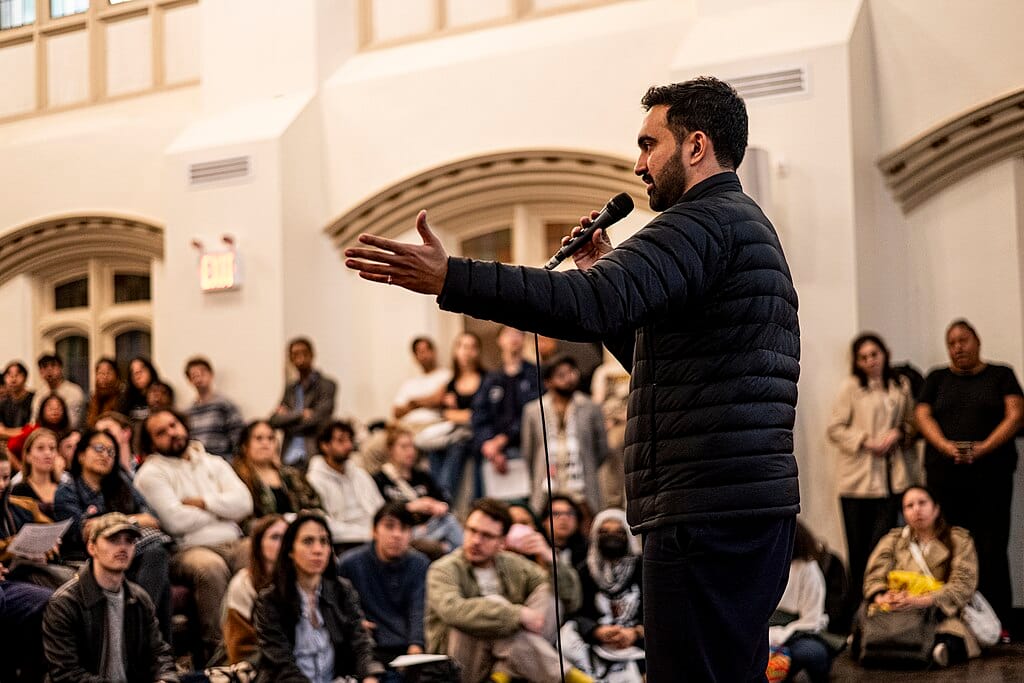Does Zohran Mamdani's win herald a socialist future?
An upset victory points to a deep-seated desire for change.
The mainstream media, and even many establishment Democrats, were caught flat-footed by Zohran Mamdani’s victory in June’s New York City mayoral primary. But for those of us active in the New York City chapter of the Democratic Socialists of America (DSA), the result wasn’t shocking. It was the product of years of organizing—of work that’s often overlooked, unglamorous, and deeply transformative.
DSA is the largest socialist organization in the United States today, but its origins date back to the 1970s. Long a small presence on the American left, the group began building serious political muscle following Bernie Sanders’s 2016 presidential campaign. That campaign, which gave voice to a generation’s discontent with inequality, capitalism, and corporate-controlled politics, inspired thousands of young people—millennials and Gen Z in particular—to join DSA and dedicate themselves to political change.
What does DSA stand for?
At its core, DSA believes that working-class people should run society—not billionaires, landlords, or corporations. That might sound idealistic, but the goals are concrete: quality housing for all, a green economy, healthcare and education as rights, and a democracy not distorted by concentrated wealth. DSA wants to shift power away from the ultra-rich and into the hands of everyday people—in our workplaces, neighborhoods, and political institutions. That means pushing for universal rent control, publicly owned utilities, free public transit, and robust labor protections, among many other policies.
Unlike many people who engage with politics as a kind of spectator sport—cheering on MSNBC or Fox News the way others watch football—DSA members are organizers. Organizing means identifying real problems in people’s lives, setting concrete goals to address them, and working together, face to face, to build power and win change. It’s not about waiting for the right leader to swoop in. It’s about building movements from the ground up.
I was one of those people who joined DSA in the aftermath of the 2016 Bernie campaign, during the first year of the Trump presidency. Since then, I’ve served as a kind of foot soldier in various campaigns—helping get candidates elected, pushing for state and local policy changes, and supporting the everyday functioning of our NYC chapter. Organizing, in truth, is not glamorous. It involves being neck-deep in Google Docs, spending weeknights on Zoom calls, and knocking on strangers’ doors in all kinds of weather. While it’s often meaningful and energizing, there are certainly easier ways to spend your free time.
And yet, tens of thousands of people are choosing to spend their time this way—unpaid, in addition to work and family responsibilities. Why? Not only out of altruism, but also out of a practical understanding: if we want a better world for ourselves, we have to build it. The victories we’re fighting for—affordable housing, good jobs, reliable transit, and democratic control over the institutions that shape our lives—benefit everyone. That’s what makes the work worth it.
In New York City, DSA has developed one of the most formidable electoral operations in the city. Members build canvassing teams that stretch across boroughs, reaching working-class communities that many traditional Democratic campaigns overlook. In contrast to the top-down strategies of some party machines, DSA campaigns emphasize direct contact: knocking on doors, having conversations, listening. When canvassers hit the streets for Zohran Mamdani, they weren’t doing so out of abstract loyalty. They were motivated by a shared vision—and by policies that would tangibly improve their lives.
Why Zohran's campaign appealed to voters
Zohran’s campaign promises were bold, clear, and unmistakably pro-worker. He advocated for free and fast public buses citywide, expanded rent protections, and the creation of publicly owned grocery stores—particularly in areas underserved by big retailers. He also pushed for universal childcare, taxing the ultra-wealthy to fund public services, and expanding municipal housing. These are policies with broad appeal among working-class New Yorkers, and DSA’s organizing strategy made sure that message reached them. The campaign was powered by volunteers who saw their own futures in the policies they were fighting for.
This combination of grounded, issue-based politics and a strong organizing model has helped DSA grow in both numbers and influence. Nationally, over 100 DSA-backed officials now hold public office, including members of Congress, mayors, and state and local legislators. In New York, DSA has built a cohort of elected officials who are not only accountable to voters, but also to the movement that helped elect them. In NYC-DSA, members regularly meet with these electeds—not just to applaud their successes, but to push them to stay true to their campaign promises.
Crucially, DSA’s work doesn’t stop at the ballot box. In fact, some of its most important work begins after elections are over. When DSA-backed officials enter office, the organization continues to mobilize, advocate, and pressure for follow-through. Campaign promises become policy demands. Our organizing doesn’t end with Election Day—it scales up.
It’s not hard to see the long-term potential here. Just as the conservative movement took decades to capture the courts and shift U.S. politics rightward, DSA aims to build long-term infrastructure for a left political project. If the movement keeps growing at this pace, it’s not unrealistic to imagine a city—and one day, a country—run according to working-class needs. In fifty years, maybe there will be a socialist majority on the Supreme Court. But to get there, the work starts now: in our neighborhoods, in our unions, on our blocks.
Zohran’s victory wasn’t a fluke. It was a proof of concept—a glimpse of what’s possible when people organize, not just protest. And it was a reminder that ordinary people still have the power to shape history—if they’re willing to do the work.

